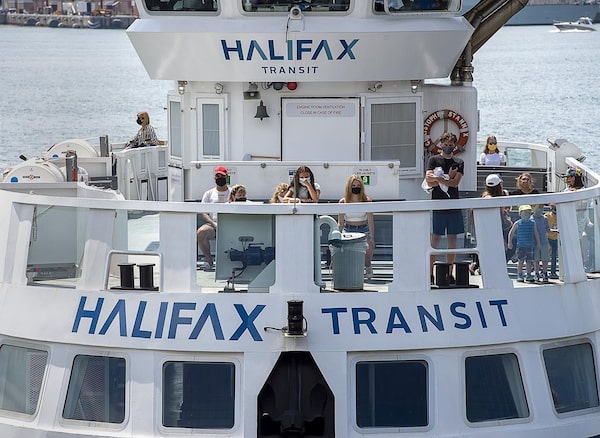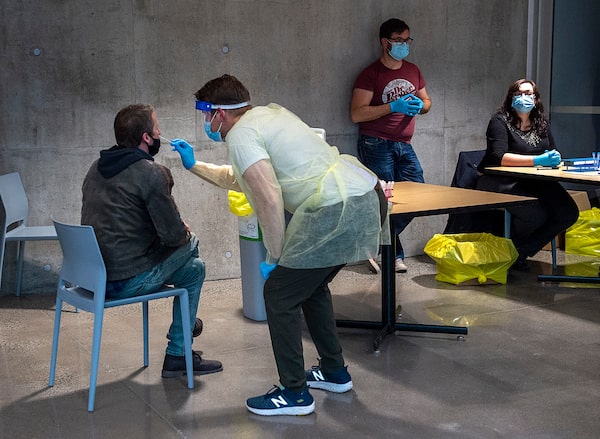A pedestrian wearing a cloth mask walks through an empty downtown in Pictou, N.S. on Sept. 29, 2020.Darren Calabrese/The Globe and Mail
Noah Richler divides his time between Toronto and Sandy Cove, N.S. His most recent book is The Candidate: Fear and Loathing on the Campaign Trail, a finalist for the Shaughnessy Cohen Prize for Political Writing
Rural Nova Scotia, heart of the Atlantic Bubble that is now on life support, has been and remains a place of extraordinary COVID-19 privilege. Here, the challenge of physical distancing is to actually find someone, anybody, going about their business as close as two metres away. And as for the contagious young – those problematic superspreaders communing in distant city pubs – despite years of enviable traffic in university students, this is a province that has never made a concerted effort to hang on to them, and they’ve left. The young have been fleeing this province in existential panic for decades. Get me to a metropolis! Find me people under 50! Not all, there’s a small and vibrant contingent making imaginative headway here and, as with the Atlantic Bubble’s calculation of COVID-19 cases, any group of more than a couple of young people is something to be excited about – a surge, an outbreak, a milestone, a cluster.
Said the CBC web headline of Aug. 8, our national disgorger of lousy news I’ve come to think of as the COVID Broadcasting Corporation: “Nova Scotia Reports No New COVID-19 Cases, Extends State of Emergency.”
Businesses in a new development on Gottingen Street in the North End neighbourhood of Halifax on Nov. 13, 2020.Darren Calabrese/The Globe and Mail
Not so long ago, that headline would have been the stuff of satire – had folk bent over in painful stitches of laughter – though not now, when humour rather than truth is the “first casualty” of the war we are fighting and a joke is harder to come by than a vaccine. Reader, make no mistake, these are precedented times – and no, that wasn’t a typo – neighbours peering over fences, wary of the menace at the borders of the territory. On the noticeboards by the village post office boxes, Nova Scotia’s guidelines for self-isolation have been posted and taken down and posted and taken down and posted again, finally with the pertinent instructions highlighted because, as they say around here, there have been sightings. Folk from Ontario, that festering petri dish — or, worse, Americans: cars with Arizona licence plates or – like the asymptomatic – travellers from central Canada or down south pretending to be us and clandestinely infecting.
Mitigating the spread of the virus I understand, but the truth of it is that the pandemic is encouraging behaviour we’ve long found contemptible – the demonization of the other most of all. Driving in and out of here during the pandemic, as a few times work has required me to do, feels more and more like a checkpoint scene from a Second World War action flick: me needing to show my papers, hoping that they’re in order and that the officer is in a good mood, while the wife I’ve travelled to fetch hides under a blanket in the back of the car beneath our journey’s provisions and the cat litter.
Visitors explore Peggy's Cove, N.S., on July 4, 2020.Andrew Vaughan/The Canadian Press
In early days, in this village that is home regardless of whatever my car’s plates say – where, since long before COVID-19, I have been spending as much time as I am able – the immediate and uncompromising adherence to health advisories would have impressed even the Swiss. Back then, if I passed a neighbour walking his dog (on the other side of the road, 4.87 metres away), they’d cut a wider path a further couple of metres into the grassy verge. Visiting contractors would ask, “Have you been to Ontario in the last two weeks?” despite the whole field that could be put between us. So Maybe it’s the Jew in me, triggered by anything that feels like an oppressive and excluding social order, but in those first weeks my occasional shopping trips to nearby Digby were nothing short of enraging, until I realized these excursions had taken the place of movies in my life, so weirdly entertaining were they.
At the Home Hardware, wary folk were lining up not one but two or even three floor stickers behind me, taking no chances. At the Superstore, where two months of shelves with no toilet paper were followed by high stacks of it on sale, a friend in the fruit section a safe couple of aisles away jumped back with such force when I said hello I thought for a moment murder hornets were clinging to me. Even at the McDonald’s drive-through, a Big Mac suddenly as exciting to me as a trip to a decent restaurant, the cars ahead and behind were keeping their distance. Lots of it. But of course mine are Ontario plates: I carry the plague.
In the Atlantic provinces, already at an advantage because of their low population density and dearth of public transport, what keeps the virus in check is community consensus and of this there has always been plenty. Case in point: In Nova Scotia, returning residents in quarantine were the ones who made a point of complaining that the government wasn’t checking up on them – they said they’d ring daily and I’m still waiting!

Passengers wear face masks on a Halifax Transit ferry as it arrives in Dartmouth, N.S. on July 24, 2020, the first day masks became mandatory on public transit.The Canadian Press
The support of restrictive measures or, in the worst-case scenario, a lockdown, is inversely proportional to the inconvenience that is felt and in this province the disruption has hardly been noticed, the economy here puttering along in second gear at the best of times. The province of Nova Scotia has the third highest median age in the country (sitting with the rest of the members of the former Atlantic Bubble at the top of the chart) and the highest percentage of seniors. It also has a sizable underground economy, so if you are actually working, and not doing so off the books, then you are very likely to be doing so unbothered in an essential service – in construction, which is booming (the price of a two by four has almost tripled since the pandemic started, a sheet of plywood is nearly double), in fishing and agriculture, or in the public sector. The economic pain of the pandemic – I am not talking about the cost in seniors’ lives – has been slight. Where I am, just about the biggest difference has been the absence of folk from away and there’s been satisfaction in that. What the virus has provided the Atlantic provinces is power, the power to say to folk perceived as having lorded it over them for 70 years,
“No, you won’t come and if you do, it’ll be on our terms.”
Indeed, the consensus is so great that Nova Scotians, who are not so much governed as hectored – when, that is, the provincial assembly sits at all – tolerate possibly the most autocratic Premier in the country. Astoundingly, the legislature here sat for just 13 days in 2020 before Stephen McNeil, who’d announced his impending resignation in August (why put up with COVID-19′s aftermath?), did the now routine and unremarkable Canadian thing and prorogued because, he said, Nova Scotians “would understand that we are selecting a new premier now and it would be inappropriate for me to go set a policy path.” Who needs government anyway? It’s up in the air, here, that sitting MPs are even necessary or what the difference would be if MLAs took Mr. McNeil’s popular COVID-19 instruction to “stay the blazes home” (which is now the title of a speedily published book celebrating Nova Scotia in the face of the pandemic) and did so permanently.

A swab is taken at a pop-up COVID-19 testing site on the Dalhousie University campus in Halifax on Nov. 25, 2020.Andrew Vaughan/The Canadian Press
Nova Scotians are an orderly bunch. They like rules and want everyone to abide by them. Now the chastised government checks up on anyone self-isolating with a daily email, although you could be anywhere when you answer it – on the one and a half kilometre expanse of the beach at Mavillette, why not, where on a busy day you might see 14 scattered others – and last Tuesday the Restaurant Association of Nova Scotia, not the government, was the party urging its beleaguered members to shut down for two weeks. (The edicts followed and are in place now). Which is why, back in September, the Chronicle Herald columnist John DeMont wrote of “the Atlantic Canadian Miracle,” asking Nova Scotians to “stand up and take a collective bow. We, as a people, have shown discipline and fortitude.”
And then, just as the province’s Chief Medical Officer Robert Strang was announcing the prevalence, for the first time, of community spread in the Central Region of the province, Halifax journalist Stephanie Nolen tempted fate even further – and lost – writing in The New York Times of living in the Atlantic Bubble “without fear” in a “magical, virus-free world … just one long day’s drive away from the Empire State Building – in a parallel dimension called Nova Scotia.”
My wife and I, seeing the bargain hotel rates on offer, took note and decided, spontaneously, to spend a couple of days in Halifax, our Big Smoke. Have someone else make dinner. Walk. Shop. We did so and it was liberating, a trip to the city and people we love and halfway back to an earlier time that seems, to all of us, so long ago. Generally, folk were cautious – wearing masks, keeping their distance, availing themselves of sanitizer everywhere. Restaurants were ingenious with the dividers they’d installed and, although operating at 50-per-cent capacity, full. The manager at the independent shop Bookmark told me his online trade was thriving and that his only real worry was that he’d not be able to adequately serve the Christmas shoppers already lining up outside. Spring Garden Road is still a shameful gallery of the panhandling houseless, but Halifax is thriving – real estate on the rise, condos burgeoning and a plethora of new downtown shops and services flourishing.
So pleased were we that, checking out, we decided to book a return trip, but Atlantic Canada’s exemption has not lasted and now the Atlantic Bubble is burst. Halifax restaurants are closed, gatherings restricted and travel is discouraged. As I write, Nova Scotia has a mere 114 active cases of the coronavirus and not a single hospitalization, but community transmission is a fact. In a province with so feeble a health care system that the wait for one of a diminished fleet of ambulances can be 90 minutes, its chief medical officer travelled to New Brunswick for treatment and, in my corner, the closest surgery is an hour and a half’s drive away - that is enough to terrify. Only now the menace at the borders of the territory is the city, in the Central Zone, and the demonization of outsiders is intraprovincial.
Said my Annapolis Royal veterinarian, when I booked an appointment after my return: “Have you been to Halifax in the last two weeks?”
Tomorrow we’re off to be tested.
Keep your Opinions sharp and informed. Get the Opinion newsletter. Sign up today.